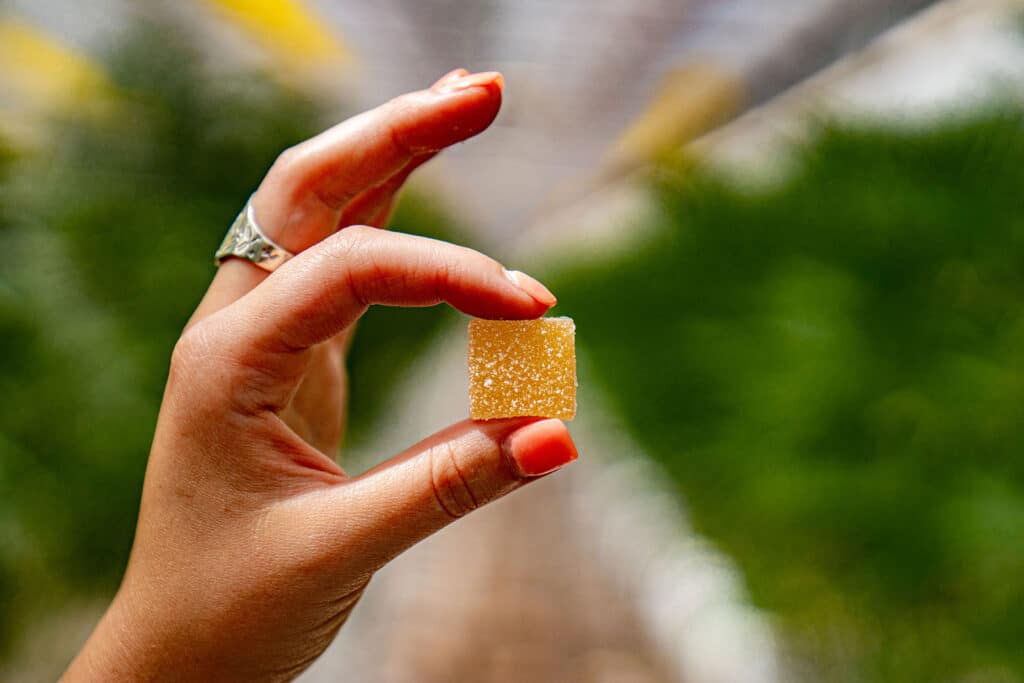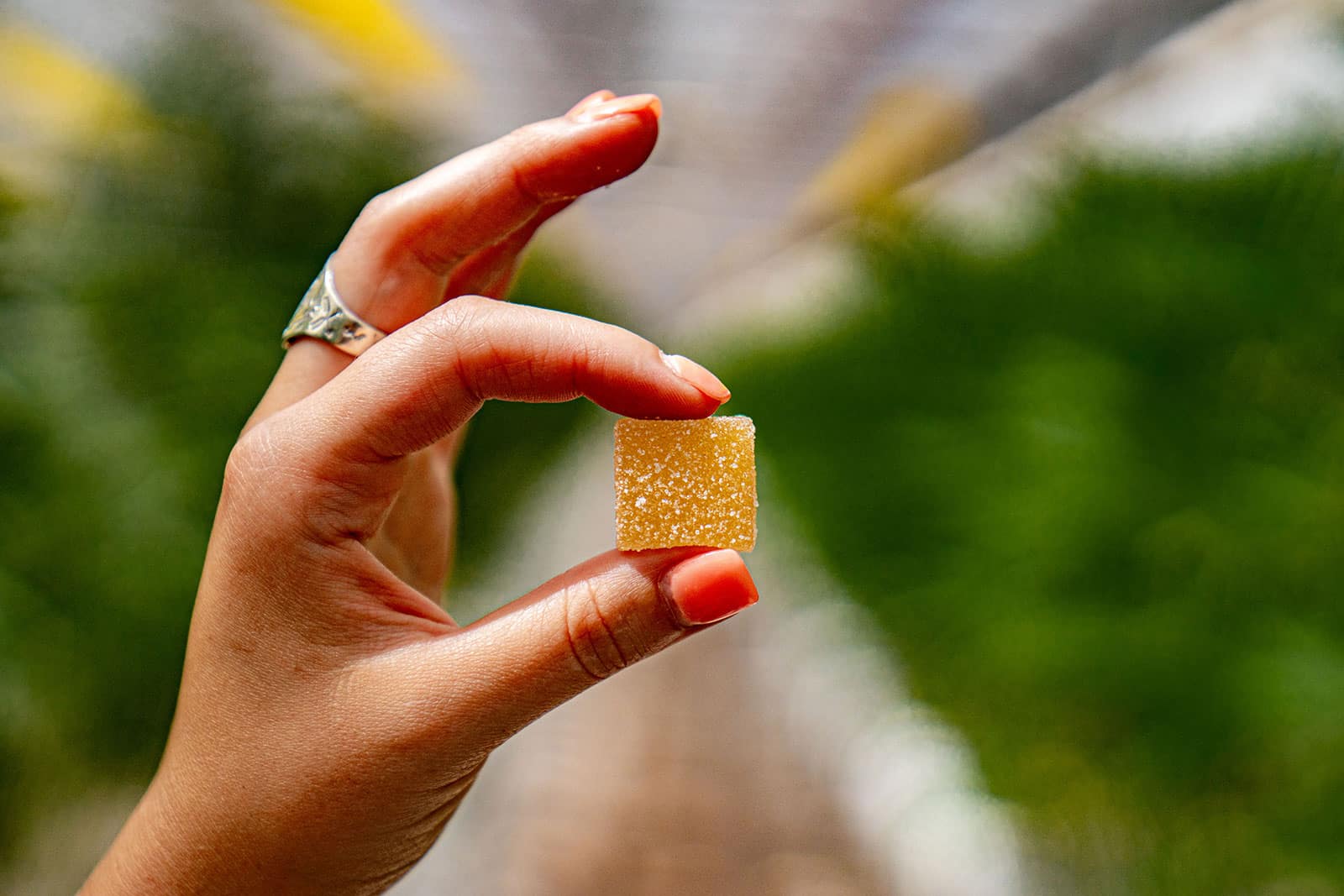The popularity of cannabis-based products, such as edibles, has been on the rise in recent years thanks to growing legalization efforts across the US. Even in states where marijuana is still illegal, edibles have become an increasingly attractive option for users who are drawn to the discreet and convenient nature of these products compared to alternative consumption methods, such as smoking.

However, edibles aren’t always as discreet as they appear on the surface. Many employers, schools, athletic organizations, and court systems screen for drug use using drug tests. These tests often look for marijuana metabolites — among other compounds — which can remain in the body for weeks after consumption. This means that edibles can show up in a drug test in certain circumstances.
Table of Contents
What Are Edibles?
Edibles are food or beverage products that have been infused with cannabis extracts. These products come in a variety of forms, such as baked goods, chocolates, gummies, hard candies, and drinks.
The main active compound found in most edibles is tetrahydrocannabinol (THC), the primary psychoactive constituent of cannabis that is responsible for producing the “high” associated with marijuana use. Edible cannabis products typically contain high levels of THC and their effects can be felt for longer periods of time than smoking or vaping.
How Do Drug Tests Work?
Drug tests, also known as toxicology tests or drug screens, are used to detect the presence of certain drugs or their metabolites in a person’s body. Common compounds screened for in these tests include THC metabolites, as well as other substances such as cocaine, opiates, amphetamines, and phencyclidine (PCP).
These tests can be conducted using a variety of biological samples, including urine, blood, hair, and saliva. Urine tests are the most common type of drug test due to their cost-effectiveness and convenient collection process. Saliva tests, also known as oral fluid drug tests, have similar benefits and are designed to detect drug use that occurred more recently.
In some cases, more invasive testing methods will be used. Hair tests, for example, are becoming increasingly popular as they can detect drug use over longer periods of time than urine tests. This type of test requires a sample of hair — approximately 1.5 inches from the root end — to be taken from the scalp or other parts of the body. Blood tests are another option that provides an extremely accurate analysis of an individual’s drug use, but they can only detect very recent drug use.
Detection of THC in Edibles vs. Smoking
The way that the body metabolizes THC from edibles is different than when smoking marijuana since the compounds must pass through the digestive system before they can be absorbed into the bloodstream. Smoking marijuana, on the other hand, bypasses the digestive system and delivers THC directly to the bloodstream by way of the lungs. The effects of smoking are almost immediate, while it can take up to four hours for someone to feel the full effects of an edible.
Because the digestive system metabolizes THC from edibles more slowly, this type of consumption may result in slightly longer detection periods for drug tests. This difference is particularly pronounced for drug tests with shorter detection windows, such as blood and saliva tests. Urine and hair tests will also be sensitive to THC from edibles, but the differences in detection windows between smoking and ingestion may not be as large.
Factors Influencing THC Detection from Edibles
Every person will metabolize THC differently, so it is difficult to predict exactly when and how long edibles will show up on a drug test. Various factors can influence the length of time that edibles will remain detectable in the body, including the dosage and potency of the edible consumed. The more potent the edible is, the longer it will take for it to be metabolized and cleared from the body.
Frequency of consumption can also play a role — if someone uses edibles regularly, the THC metabolites will be detectable in urine and hair tests for significantly longer periods than if an occasional user were to take a single dose. Even among regular users, the frequency of use will still have an effect on the overall detection window. For example, a person who uses edibles daily will likely have a longer detection window than someone who uses edibles every other day.
General metabolism rates can also vary significantly between individuals. People with slower metabolisms may have longer detection windows than those with faster metabolisms as it will take more time for the body to process and eliminate the THC from edibles.
Finally, body fat percentage can affect how long edibles will show up in drug tests. THC is fat-soluble, meaning that it can be stored in fat cells for extended periods of time. People who have higher body fat percentages will likely store more THC metabolites in their bodies, resulting in longer detection windows.
Window of Detection for Various Tests
Each type of drug test has a different detection window, meaning that the amount of time a substance can be detected in your body may vary depending on the type of sample being tested. Individual factors, combined with the type of sample used, will affect how long edibles can be detected in a drug test.
The window of detection for THC from edibles in each type of test is as follows:
- Urine: three to 30 days, with occasional users typically testing positive for up to three days, and regular users potentially testing positive for up to 30 days after the last use
- Blood: three to four days after the last use
- Hair: up to 90 days after the last use
- Saliva: up to three days after the last use
It’s important to note that these detection windows are estimates. The actual time period during which edibles will show up in a drug test can vary significantly from person to person.
Possible False Positives and How to Avoid Them
It is possible for certain medications or supplements to produce false positives on drug tests. A false positive occurs when the test detects a substance that is not actually present in the body.
While THC is less likely to result in a false positive than certain other substances, there have been instances where a person’s test results were inaccurately interpreted due to the presence of other substances in their system. These include:
- Dronabinol (a synthetic form of THC used to treat nausea and loss of appetite from certain medical conditions)
- Efavirenz (an antiretroviral medication used to treat HIV/AIDS)
- NSAIDs (non-steroidal anti-inflammatory drugs such as ibuprofen
- Promethazine (an antihistamine used to treat allergies and motion sickness)
- Riboflavin (a B vitamin present in many multivitamins)
- Ethacrynic acid (a loop diuretic used to treat fluid retention)
Non-THC hemp and cannabis products, including CBD, also have the potential to produce false positives. These products may legally contain less than 0.3% THC. This small amount rarely produces a false positive in typical users, but consuming large amounts may cause a false positive to occur.
If you are taking any medications or supplements, it is important to disclose this information to the individual administering the test. This will help the lab accurately interpret the results of your test and detect any false positives that may occur due to the presence of other substances in your system.
Legal Implications and Workplace Policies
Nearly half of all US states have legalized recreational cannabis use, and even more states allow medical cannabis use with a prescription. Despite this, cannabis remains classified as a Schedule I drug at the federal level. As such, it remains illegal for recreational and/or medical use in many parts of the country.
Here in Florida, recreational cannabis use is currently illegal, but cannabis is legal for medical purposes with the diagnosis of a qualifying medical condition and a state-issued medical marijuana card. However, employers and other organizations can still enforce their own zero-tolerance policies, and an employee who uses legal medical marijuana may still be subject to the consequences of a positive drug test. This may include termination of employment, denial of benefits, or other repercussions.
Failing a drug test in regions where you aren’t legally allowed to use cannabis can also have legal repercussions. Employers typically won’t report a positive drug test to law enforcement, but it is possible for it to happen in certain circumstances. Furthermore, if you test positive for THC or other drugs while on probation or parole, you may be in violation of the terms of your release.
Recommendations
Given the potential ramifications associated with THC consumption and drug testing, it’s important to be aware of any legal restrictions and potential workplace policies related to drug use. Additionally, if you are taking edibles and anticipate a drug test in the near future, it is best to avoid consuming them for at least a week or two before the test. This will increase the likelihood that the THC will be completely eliminated from your body by the time of the test.
Finally, if you think you may have a problem with drug abuse, you may want to consider seeking help from a qualified professional. Here at Miracles Recovery Center, we provide a range of inpatient and outpatient treatment options to individuals in the Port St. Lucie area. Our caring team of addiction professionals is here to provide you with the support and guidance you need on your journey to lasting recovery. To learn more about our services, contact us today.
References
https://www.medicalnewstoday.com/articles/324315
https://www.usnews.com/news/best-states/articles/where-is-marijuana-legal-a-guide-to-marijuana-legalization
https://www.ncsl.org/health/state-medical-cannabis-laws#:~:text=Medical%2DUse%20Update,1%20below%20for%20additional%20information.
https://pubmed.ncbi.nlm.nih.gov/11765026/
https://www.ncbi.nlm.nih.gov/pmc/articles/PMC6170116/
https://healthyhorns.utexas.edu/marijuana.html#:~:text=Tetrahydrocannabinol%20(THC)%2C%20the%20main,to%20two%20days%20after%20smoking.










